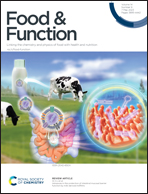Regulation of glucolipid metabolism and gut microbiota by green and black teas in hyperglycemic mice†
Abstract
A high-sugar and -fat diet (HSFD) has become a primary risk factor for diabetes, and dietary intervention shows a substantial effect on the prevention and management of hyperglycemia. In this study, the chemical compositions of the aqueous extracts of stir-fried green tea (GT) and congou black tea (BT) were compared. Moreover, their potential mechanisms and regulatory effects on hepatic glycolipid metabolism and gut microbiota disorders in hyperglycemic mice were further explored. Our results show that GT or BT intervention had a prominent regulatory effect on glycolipid metabolism. Moreover, they could significantly regulate the levels of serum metabolic signatures, the activities of key enzymes in liver glucose metabolism, and the expression of genes or proteins related to glycolipid metabolism via activating the IRS-1-PI3K/AKT-GLUT2 signaling pathway. Significantly, GT or BT administration adjusted the composition and diversity of the gut microbiota, mainly reflecting a significant increase in the abundance of beneficial bacteria (including Allobaculum, Lactobacillus, and Turicibacter) and reducing the abundance of harmful or conditionally pathogenic bacteria (mainly including Clostridiales and Bacteroides). Our results suggest that dietary supplementation with GT or BT could exert a practical anti-diabetic effect. Meanwhile, BT intervention showed a better regulation effect on glycolipid metabolism. This study reveals that GT and BT have excellent potential for developing anti-diabetic food.



 Please wait while we load your content...
Please wait while we load your content...